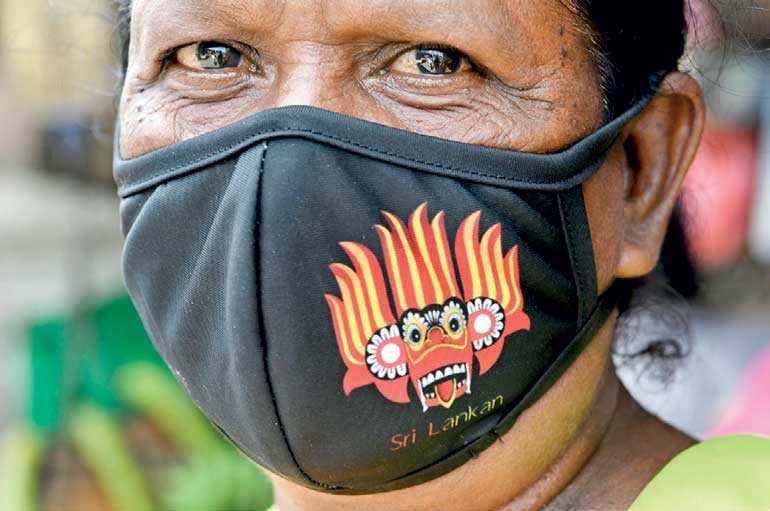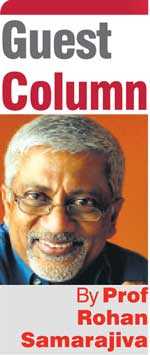Tuesday Feb 17, 2026
Tuesday Feb 17, 2026
Tuesday, 24 November 2020 00:47 - - {{hitsCtrl.values.hits}}

The limitation of movement has significant positive externalities. Everyone benefits, including daily wagers and politicians. But the costs are not borne evenly. The burdens are disproportionately borne by daily-wage earners cooped up in tiny tenements without money to buy food and no certainty about what next week and next month would bring – Pic by Shehan Gunasekara
Over the past five decades, we have had two Constitutions (1972 and 1978), a third that came close to adoption (the “package” of 2000), 19 amendments, and a whole lot of talk and writing around each. It is reasonable to infer Constitutional fatigue.
The Government has promised a new Constitution. It has the votes in a docile Parliament; and depending on the efficacy of its perception management efforts, it may have the votes to win a referendum. But now that a hyper-presidential system has been consolidated through the 20th Amendment, will it expend political capital on a new Constitution? But it may be wise to be ready to respond if the Government chooses to keep its promises.
But such a commitment requires a good answer to the question of what a Constitution can do. Can it free the unjustly imprisoned? Can it feed the hungry? The former question exemplifies the bad that may be avoided; the latter the good that may be expected. A good Constitution can do both, though not always on the same timescale. The answers may be worked up using a contemporary case: the effects of COVID-19 quarantine curfews on people’s livelihoods.
The case
Imagine a day in the life of a daily wage earner, before COVID-19. Of a woman who makes her living by providing cleaning services to several houses in Colombo. She was free to take public transport, and on occasion a three-wheeler to get to work. She was free to take up or decline work and negotiate rates and days. She was free to keep cash, put some money in a bank and withdraw when needed. She could choose the vendors from whom she purchased groceries and other items.
It was no walk in the park. The work was hard, the madams were not always nice, the buses crowded… But she was able to feed her family and live her life. She could make small donations and participate in a Seettu. She was not dependent on handouts or charity. She had liberty.
Now imagine her life under quarantine curfew with drones overhead. The money has run out, the jewellery is in the pawn shop. She cannot work, she cannot earn. Even when she has money, she cannot choose; she must buy whatever is offered at whatever price by whoever comes down the lane. She must rely on handouts from Government and from others.
This is what the loss of liberty is for daily wage earners, for those whose work requires co-presence, those most affected by curfews. The freedom to earn a living, to traverse public thoroughfares, to choose from whom to buy and what, to have some peace with the children out playing. All taken away by distant politicians and officials whose earnings are certain, who have no worries about food on the table when they are driven home by a chauffeur after a drink at the Hilton with a friend.
The bad that may be avoided
This is what is achievable within a short timeframe. Even a Constitution that does not provide for justiciable socio-economic rights such as Sri Lanka’s present one may be of help. Article 14(1)(g) states that “every citizen is entitled to the freedom to engage by himself or in association with others in any lawful occupation, profession, trade, business, or enterprise.” Article 14(1(h) recognises “the freedom of movement… within Sri Lanka.”
The exceptions to the two rights specified in Article 15 are of limited scope. They would not prevent a citizen who has been deprived of the ability to earn a living and use public thoroughfares by Executive or administrative actions (including by the President) from asking the Supreme Court under Articles 17 and 126 to determine that her rights have been infringed and to order relief.
The curfew may be justified. It may be needed to prevent the health system from being overwhelmed; to save the lives of the elderly and those with weakened immunity; to buy time to get the tests and the acute-care beds and the PPE [personal protective equipment] organised.
The limitation of movement has significant positive externalities. Everyone benefits, including daily wagers and politicians. But the costs are not borne evenly. Those with curfew passes and Government vehicles may bear none. Those among them who exercise discretionary authority may even benefit. The burdens are disproportionately borne by daily-wage earners cooped up in tiny tenements without money to buy food and no certainty about what next week and next month would bring.
Let us assume that the curfew imposed under the Quarantine and Prevention of Diseases Ordinance, No. 3 of 1897 as amended, is perfectly legal. Article 16 of the Constitution states that all prior laws are valid even if they violate the fundamental rights granted by the Constitution. If the law and the regulations made under it have been followed, the Executive actions may not be directly challenged. But a good lawyer, supported by public opinion as shown by media coverage and positions taken by opinion leaders, may stand a good chance of gaining compensation for the lost earnings of our citizen. Or just the court case and the associated publicity may change Government actions. The principle of providing compensation when the state takes away assets or livelihoods is well established.
The Government has, since the first lockdown, recognised the impact on daily wage earners though not framing it in terms of compensation for the harm done to them by State action. The paltry compensation has been presented as charity or election handouts. A successful action under the Constitution would reframe the problem in terms of just compensation and entitlement, not handouts; it would open the door to moving away from the token Rs. 5,000 per month to realistic amounts needed by a household and, ideally, compensation for lost earnings.
According to the Government’s own Household Income and Expenditure Survey (done every three years, but latest available is from 2016), it is not possible for an average household (approx. four people) to meet their food requirements with Rs. 5,000 a month, as claimed by Minister Wimal Weerawansa in Parliament.
In 2016, the mean household expenditure was Rs. 54,999 per month, of which Rs. 19,144 was spent on food. Considering inflation and assuming frugality, a minimum of Rs. 20,000 per month per household would be needed just for food. Deaveraged numbers would be best so higher costs in areas such as Colombo are recognised. Not all households are of similar size or have similar needs, so adjustments may be required as discovered in the first lockdown.
The Constitution may have other uses as well. As people in isolated areas protest their condition, they may face various forms of repression and arrest. Here, they can seek relief for infringement of their freedom to peaceful assembly (Article 14(1)(b)) and other associated rights. They may also seek remedies from the Court of Appeal under its writ jurisdiction (Articles 140 and 141).
The good that may be expected
It is not easy for an aggrieved citizen to proactively assert her rights, evidenced by the fact that such legal cases have not been initiated yet. The first protests have been in the streets. The first formal communication has been through MPs raising questions in Parliament. Political remedies appear to be preferred to Constitutional ones.
Would it not be better if the State does its duty without placing the onus on citizens?
This would require an efficient, responsive and well-resourced State. This can happen under any Constitutional arrangement, including one that includes justiciable socio-economic rights. But the utility of the state response will depend on actions prior to the pandemic. Even if the right to adequate food is included in the Constitution, it is unlikely that a practical and generally applicable remedy will be available in the absence of prior planning and preparation by the State.
Italy’s Constitutional right to employment has been in place for decades, but there are many without employment in that country. South Africa’s justiciable Constitutional right to housing and the right to shelter for children was interpreted as not giving respondents an immediate right to claim shelter. Nepal has “a right to quality foodstuffs” in addition to rights to food and to food sovereignty, but not everyone has a court decreed full belly in Nepal. Socio-economic rights in Constitution come with escape clauses and doctrines because it is simply impractical for courts to formulate and implement policy.
So, the foundational question is what contribution a Constitution can make to the emergence of an efficient, responsive and well-resourced state. Generally, such qualities are correlated with prosperity. Whether improvements in state organisation and quality of civil servants cause prosperity or whether prosperity results in the emergence of an efficient state is yet unresolved.
A Constitution that makes the Executive accountable for its actions without disabling decision making and implementation is likely to contribute to prosperity. The available evidence suggests that Constitutional provisions that reduce the risks of outright or administrative expropriation by the state are conducive to the kinds of private investment that contribute to prosperity.
A non-corrupt judicial system that delivers timely and impartial justice appears essential. Without it, the justiciable fundamental rights, the accountability provisions and the safeguards for investment are meaningless. A Legislature that takes its responsibilities seriously by making good laws and exercising proper oversight also appears a necessary condition.
If these conditions are in place, it is more likely that the resources for compensating citizens deprived of their earning capacity will be mobilised and that efficient mechanisms for disbursing such compensation will be set in place, especially in the case of a nine-month old pandemic. None can claim surprise at this point.
If the State did its duty, there would be no need for street protests. Parliament and fundamental rights petitions can smoothen the rough edges of the compensation program. We would be on the way to living in Ketumati, the Sri Lankan equivalent of the shining city upon a hill.